Sacco and Vanzetti: A New American Opera
The long-delayed Marc Blitzstein opera "Sacco and Vanzetti," the story of a terrible miscarriage of justice in Massachusetts in the 1920’s, optioned by The Metropolitan Opera in 1960 on a Ford Foundation commission and completed by composer/conductor musicologist Leonard J. Lehrman in 2021, finally made it to the stage in its first full production.
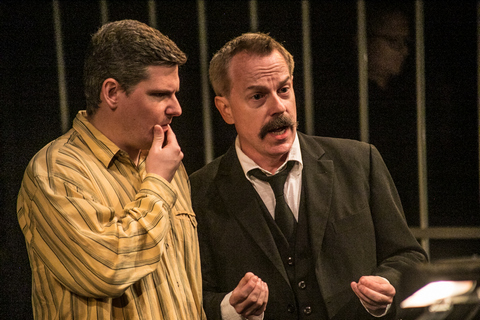
Christopher Remkus as Nicola Sacco and Michael Niemann as Bartolomeo Vanzetti in a scene from the After Opera Company world premiere of the Blitzstein/Lehrman opera “Sacco and Vanzetti” (Photo credit: Joel Simpson)
[avatar user=”Victor Gluck” size=”96″ align=”left”] Victor Gluck, Editor-in-Chief[/avatar]
The long-delayed Marc Blitzstein opera Sacco and Vanzetti, the story of a terrible miscarriage of justice in Massachusetts in the 1920’s in which two confirmed anarchists and socialists were accused of a murder they did not commit, originally commissioned by The Ford Foundation and optioned by The Metropolitan Opera in 1960 but completed in 2001 by composer/conductor musicologist Leonard J. Lehrman, finally made it to the stage in its first full production at Lehman College on September 10 and 11, 2022. While not produced under optimum conditions, the finished opera still turned out to be a powerful theatrical and musical experience.
The manuscript of the opera had been reported lost at the time of Blitzstein’s murder in Martinique in 1964 but subsequently discovered locked in the trunk of his car left in New Rochelle at a friend’s apartment, and then moved to storage in Long Island City. Many major American composers including Leonard Bernstein (Blitzstein’s executor), David Diamond, Elie Siegmeister, William Bolcom and Daron Hagen considering finishing the incomplete drafts but all found it “too fragmentary.”
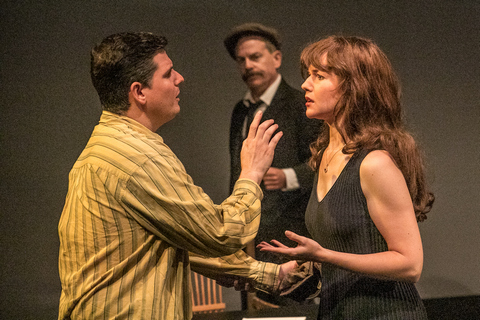
Christopher Remkus as Nicola Sacco, Michael Niemann as Bartolomeo Vanzetti, and Perri Sussman as Rosa Sacco in a scene from the After Opera Company world premiere of the Blitzstein/Lehrman opera “Sacco and Vanzetti” (Photo credit: Joel Simpson)
Although Lehrman was shown the materials in 1970, he was not given permission to finish the opera until 1999. His completed opera had its first produced staging to a solo piano at The White Barn Theatre in Westport, Connecticut, in August 2001. And then 9/11 the following month made an opera advocating the innocence of two foreign anarchists unproduceable.
Blitzstein, who has been called “the father of American opera in the vernacular,” was a left wing musical genius who had the most infernal luck, not just with Sacco and Vanzetti but with many of his major works. He is best known for The Cradle Will Rock, his labor opera, which was supposed to begin previews on Broadway on June 16, 1937 under the auspices of The Federal Theatre Project. Unfortunately some politicians decided that it was too radical and locked the performers and audience out of the Maxine Elliott Theatre at 109 W. 39th Street.

Kevin Courtemanche as Police Officer Vaughan, Christopher Remkus as Nicola Sacco, Michael Niemann as Bartolomeo Vanzetti and Christopher Tefft as Police Officer Connolly in a scene from the After Opera Company world premiere of the Blitzstein/Lehrman opera “Sacco and Vanzetti” (Photo credit: Joel Simpson)
The now iconic story is that the audience and the performers marched 21 blocks north to the Venice Theatre (932 Seventh Avenue at W. 58th Street) where they were informed that the musicians’ union refused to allow their members to play unless producer John Houseman could provide their full salary and Actors’ Equity Association would not allow its members to perform onstage without the express permission of the original producer (i.e. the federal government.) With composer Marc Blitzstein at the piano and the actors seated among the audience, the opera went on to be one of the legendary opening nights in American theater history. To this day, The Cradle Will Rock is usually revived to one piano rather than the full orchestration as it was first performed on that night.
Sacco and Vanzetti was equally cursed with its own Blitzstein moment at Lehman College’s Studio Theatre on Sept. 11, 2022. At a supposed slight by the conductor, 13 of the 27 musicians, members of the Metropolitan Philharmonic Orchestra, refused to play the second half of the matinee performance (the one under review) and it became necessary for the composer to play the rest of the score on a partially tuned piano, drowning out some of the singers, while he also conducted from the piano bench. As a result, the audience heard only half of the orchestrations as originally written.
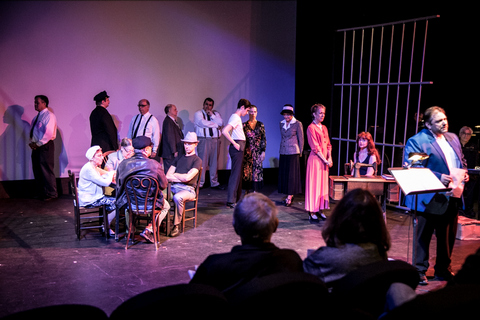
Cast of the After Opera Company world premiere of the Blitzstein/Lehrman opera “Sacco and Vanzetti” (Photo credit: Joel Simpson)
The finished score by Lehrman is 50% music he created based on themes by Blitzstein: pieces of his unproduced 1932 opera The Condemned (an earlier work about Sacco and Vanzetti), a march, a cabaret song, a song cycle, a piano piece for mezzo-soprano Brenda Lewis who had starred in Blitzstein’s 1949 opera Regina (based on Lillian Hellman’s The Little Foxes), and portions of 13 songs from Reuben, Reuben, his 1955 folk opera set in Little Italy which failed in Boston and which he had been recycling in later works. Blitzstein’s libretto for the three-act Sacco and Vanzetti (performed at Lehman College in two parts) was based on transcripts, letters, and interviews with the principals involved in the case. One addition approved by the estate was the inclusion of Governor Michael Dukakis’ exoneration of Sacco and Vanzetti in 1977, the 50th anniversary of their execution, as a fitting new ending to the opera.
While the text is mostly recitative (the setting of spoken speech), there is a great deal of music (which lasted four hours including intermission on the opening of September 10.) The opera begins with a crash of chords which sound very much like Kurt Weill. (Of course, most of us know Weill’s The Threepenny Opera in the Blitzstein translation and adaptation so that this should not be so surprising.) The opening scene is a choral ode for the majority of cast which begins with the final scene to the opera and is reprised at the end. Establishing early on that Sacco and Vanzetti’s form of anarchy was to make the world equal for all, the second scene is of Nicola Sacco and his wife Rosa rehearsing a scene for a benefit for strikers from Ibsen’s A Doll’s House in Italian (the only scene in the opera not in English) which resembles music by Puccini. The score continues mixing jazz elements (with solos for clarinet, saxophone and flute) with more traditional melodies.
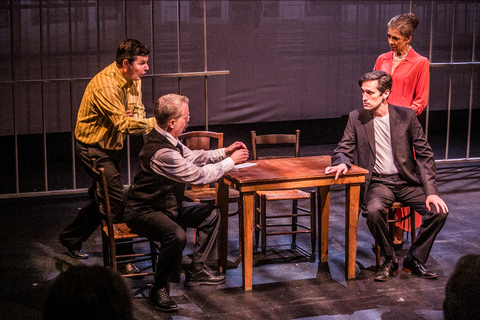
Christopher Remkus as Nicola Sacco, Michael Niemann as Bartolomeo Vanzetti, Jonathan Z. Harris as Attorney John W. McAnarney, Esq., and Sarah Blaze as Elizabeth Glendower Evans in a scene from the After Opera Company world premiere of the Blitzstein/Lehrman opera “Sacco and Vanzetti” (Photo credit: Joel Simpson)
The second scene occurring on May 5, 1920 establishes that Vanzetti could not drive a car, Sacco did not how to fire a gun, and later we learn that on the day of the murder and robbery, Sacco was in Boston filing for a passport in order to return to Italy for a family funeral. We see that both Sacco and Vanzetti were in the wrong place at the wrong time when they entered Elm Square Garage in West Bridgewater, where because they had Italian accents they were assumed to be the perpetrators the police were looking for. Imprisoned they are not told why they have been jailed and believe it is because of their socialist and anarchist beliefs. Witnesses are suborned to say that they were seen at the crime. Brought to Dedham Courthouse on May 31, 1921, it becomes quite clear that anti-Italian and anti-Socialist prejudice is at work. In their cells once again, Vanzetti is extremely bitter, while Sacco pours out his frustration to his wife.
The second part of the opera picks up with Act II, Scene 3 of the original libretto. While there are many witnesses for Sacco and Vanzetti’s alibis, all are Italian and believed to be lying to support each other. Sacco conducts a hunger strike and another prisoner confesses to the crime but he is not believed. Interviewed by naive young journalist Phil Stong of the New York World (later author of the novel State Fair), he assures them that their conviction will be voided. Nobel Prize winners speak out in their defense to no avail. Sentenced to death, their appeal goes to Massachusetts Governor Fuller whose select committee is headed by Harvard President A. Lawrence Lowell, but due to anti-Italian sentiment, they refuse to overturn the conviction. Going to the electric chair on August 23, 2027, after seven years of incarceration for a crime they did not commit, Sacco dies extolling anarchy but Vanzetti proclaims that “I wish to forgive some people for what they do.” We then hear Gov. Dukakis’ speech exonerating them on July 19, 1977.
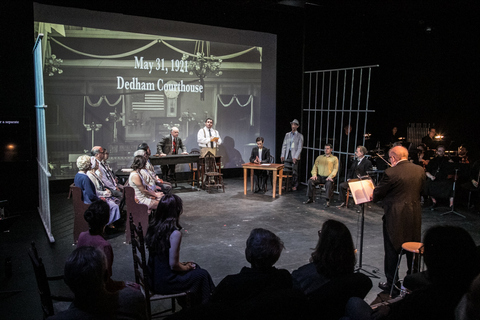
Kevin Courtemanche as Judge Thayer, Richard Risi as Clerk, Andrew Klima as Defense Attorney Moore, Jonathan Z. Harris as Defense Attorney McAnarney, Christopher Remkus as Nicola Sacco, Michael Niemann as Bartolomeo Vanzetti , Jury, and conductor Leonard J. Lehrman in a scene from the After Opera Company world premiere of the Blitzstein/Lehrman opera “Sacco and Vanzetti” (Photo credit: Joel Simpson)
Possibly due to the opera’s many scenes, set designer Joshua Rose’s minimal settings were made up only of tables and chairs as well as gates for the prison cells. More effective were the historic slide projections used as each new character entered, as well as documentary footage for appropriate scenes, created by Maxwell Bowman. Staged by Benjamin Spierman, General Director of the The Bronx Opera, the production uses 20 singers and actors to play 43 roles, some of whom play up to five characters. While no one is credited with the costumes which range from period to contemporary, the choice has been to add or subtract a piece of clothing to differentiate roles (i.e. a hat, a jacket, etc.) which does not solve the problem of keeping the characters straight when so many reappear in the subsequent scenes. The cast varied from excellent opera singers to those who were only barely adequate for their roles.
Tenor Christopher Remkus as Nicola Sacco and baritone Michael Niemann as Bartolomeo Vanzetti made an excellent contrast as the two protagonists. Remkus’ Sacco, madly in love with his wife Rosa, was extremely emotional, and did a fine job with his several arias, given more than the other characters. As the older Vanzetti, Niemann was brooding, reticent, intellectual and somber. Perri Sussman’s Rosa Sacco had a lovely soprano voice joined to Remkus’ tenor.
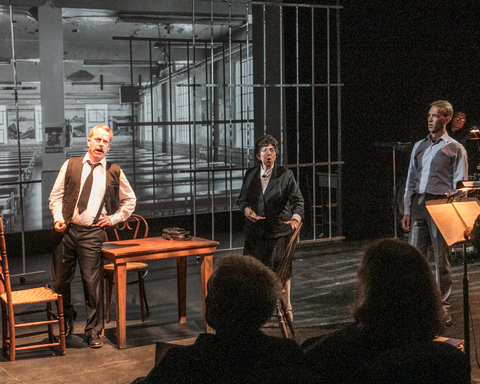
Michael Niemann as Bartolomeo Vanzetti, Helene Williams as Mary Donovan and Andrew Klima as Aldino Felicani in a scene from the After Opera Company world premiere of the Blitzstein/Lehrman opera “Sacco and Vanzetti” (Photo credit: Joel Simpson)
Heard only in the second half, mezzo-soprano Sarah Blaze as social reformer Elizabeth Glendower Evans made a very strong impression as a do-gooder on the right side of history. Impressively, former Governor Michael Dukakis of Massachusetts recorded his own speech from 1977 exonerating Sacco and Vanzetti which appears in the opera’s final scene. On the other hand, tenor Kevin Courtemanche chose to make prejudiced Judge Webster Thayer who presided over the trial into a comic caricature which did not help the proceedings.
Despite the lack of production values, and orchestra members in the second half of the performance, the Blitzstein/Lehrman Sacco and Vanzetti is a major American opera that deserves to be heard. It is impossible to define where Blitzstein’s music ends and Lehrman’s contribution begins which is high praise. Hopefully it will take its place in the American repertory alongside Blitzstein’s The Cradle Will Rock and Regina as examples of vernacular opera that hold the stage. It deserves to be performed with a larger company and with more elaborate sets and costumes which it would have received if The Metropolitan Opera had staged the original commission.
Sacco and Vanzetti (September 10 and 11, 2022)
After Dinner Opera Company & The Metropolitan Philharmonic Chorus and Orchestra
Lehman College Studio Theatre, 250 Bedford Park Boulevard West, in the Bronx
For information: call 516-825-2939
Running time: Part I (one hour and 45 minutes with full orchestra)
Part II (one hour and 15 minutes with piano and partial orchestra)






Leave a comment